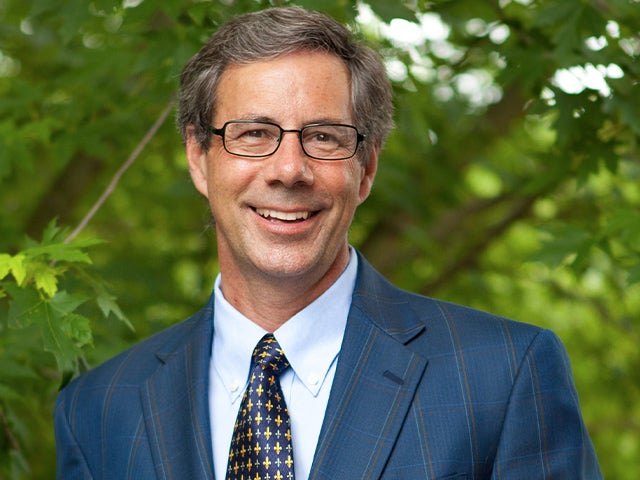Robert J. Morgan: 100 Bible Verses That Made America
Knowing Our History And The Bible's Influence On It
Robert’s love for American history began in his freshman year of college with a professor who made it come alive for him. Ever since then, he’s devoured biographies of our nation’s founders, and become what he calls an “armchair historian.” He believes it’s critical to know our history because it’s currently being pushed aside by secularism, revisionism, and leftist ideology with an atheist bias.
Through copious research, Morgan found that our nation’s founders had the highest regard for the wisdom and instruction of Scripture, starting with George Washington. On his inauguration day in 1789, as he was sworn in as our nation’s first president, he reverently bent down and kissed the Bible. “The founders of the United States of America revered the Bible because it reflected their awareness of God’s authority over the nations,” he states. “Washington did not place his hand on the Declaration of Independence or the Constitution of the United States, as hallowed as those documents are. Nor did he kiss the pages of any other religious or secular tome. It was the Bible that sanctified the moment. The Bible, he knew, had ushered American history to this point.”
Pastor Morgan cites many key figures in American history and their high view of God’s Word, for example, John Adams: “The Bible contains the most profound philosophy, the most perfect morality, and the most refined policy that was ever conceived on earth. I believe (it) to be the only system that ever did or ever will preserve a republic in the world.” And Abraham Lincoln, in a letter dated September 7, 1864: “In regard to this Great Book, I have but to say it is the best gift God has given to man. All the good the Savior gave to the world was communicated through this Book.” And the larger-than-life Theodore Roosevelt: “A very large number of people tend to forget that the teachings of the Bible are so interwoven and entwined with our whole civic and social life that it would be literally – I do not mean figuratively, I mean literally – impossible for us to figure to ourselves what that life would be if these teachings were removed.”
Morgan adds his own wholehearted affirmation to their words. “The Bible is a lamp to our feet and a light to our path; when it burns low, our culture grows dark. The best way to keep America strong is to know her history, to honor her roots, to preserve her legacy, and to cherish the eternal God who, in His providence, placed this continent between two shimmering seas, and who, in His goodness, provided a Book that became her moral and intellectual foundation: the Holy Bible.”
Lincoln's Last Words
No less than 100 Bible verses are illustrated in Morgan’s book by key moments in American history. One such example centers on our illustrious sixteenth president. Some readers may be surprised by Morgan’s statement that Lincoln was not persuaded by the Christian faith as a young man, but was, in point of fact, an agnostic, maybe an atheist, and an avid reader of anti-Christian books. In the mid-1830s, he says, Lincoln even wrote a book which attacked the divinity of Christ. Morgan illustrates how President Lincoln’s spiritual convictions had changed later in life, as attested to by Dr. Phineas Gurley, pastor of the Presbyterian church near the White House. “I have had frequent and intimate conversations with him on the subject of the Bible…In the latter days of his chastened and weary life, after the death of his son, Willie, and his visit of the battlefield of Gettysburg, he said, with tears in his eyes, that he had lost confidence in everything but God, and that he now believed his heart was changed and that he loved the Savior.” On April 14, 1865, as he and Mary sat in Ford’s theatre, watching a production of “Our American Cousin,” Morgan says Lincoln leaned over and whispered to his wife his hope when the war ended: “We will visit the Holy Land and see those places hallowed by the footsteps of the Savior. There is no place I so much desire to see as Jerusalem.” Moments later, Morgan reminds us, John Wilkes Booth ended that possibility and the President's life.
At the funeral, Pastor Gurley reassured mourners over and over with what he believed would be Lincoln’s last charge to them: “Have faith in God,” quoting Mark 11:22. “… his abiding confidence in God. This was his noblest virtue, his grandest principle -- the secret alike of his strength, his patience, and his success; and this, it seems to me, after being near him steadily and with him often for more than four years, is the principle by which, more than by any other, ‘He being dead, yet speaketh.’ And by this he will speak through the ages and to all rulers and people in every land…have confidence in God.”
The Four Chaplains
Less than eight weeks after “The day that will live in infamy,” as President Roosevelt dubbed December 7, 1941 when the Japanese attacked Pearl Harbor, another great moment in history took place on an American transport ship, Morgan recounts. It was February 3, 1942, when the Dorchester carried thousands of U.S. troops to Europe, including four clergymen who enlisted after Pearl to support the men as chaplains. They were: George Fox, a Methodist; Alexander Goode, a rabbi; Clark Poling, Dutch Reformed; and John Washington, a Catholic. Not long after midnight, the ship was struck by a torpedo from a German submarine. Lights went out, steam pipes broke, and panic filled the ship. All four chaplains raced to the deck to start handing out life jackets as men were abandoning ship. When one frantic soldier yelled that he couldn’t find his jacket, Chaplain Fox took off his own and said, “Here’s one, soldier.” One by one, all four chaplains gave away their life jackets, gloves, and whatever else they had to help others, and prayed for the fleeing men as the Dorchester listed and started to sink.
Survivor James Eardley was the last man known to have seen the chaplains alive. “I was on a life raft and…when the ship rolled over…that’s when I saw the four chaplains, (who) had climbed up on the keel, and they were standing arm in arm…And then…she nosed down (and) they slid off…into the water.”
Eight years to the day later, President Harry Truman dedicated the Chapel of the Four Chaplains in Philadelphia, saying, “They really lived up the moral standard that says, 'Greater love hath no man than this, that a man lay down his life for his friends’ (John 15:13). They were not afraid of death because they knew the Word of God is stronger than death. Their belief, their faith, in His Word enabled them to conquer death.”




